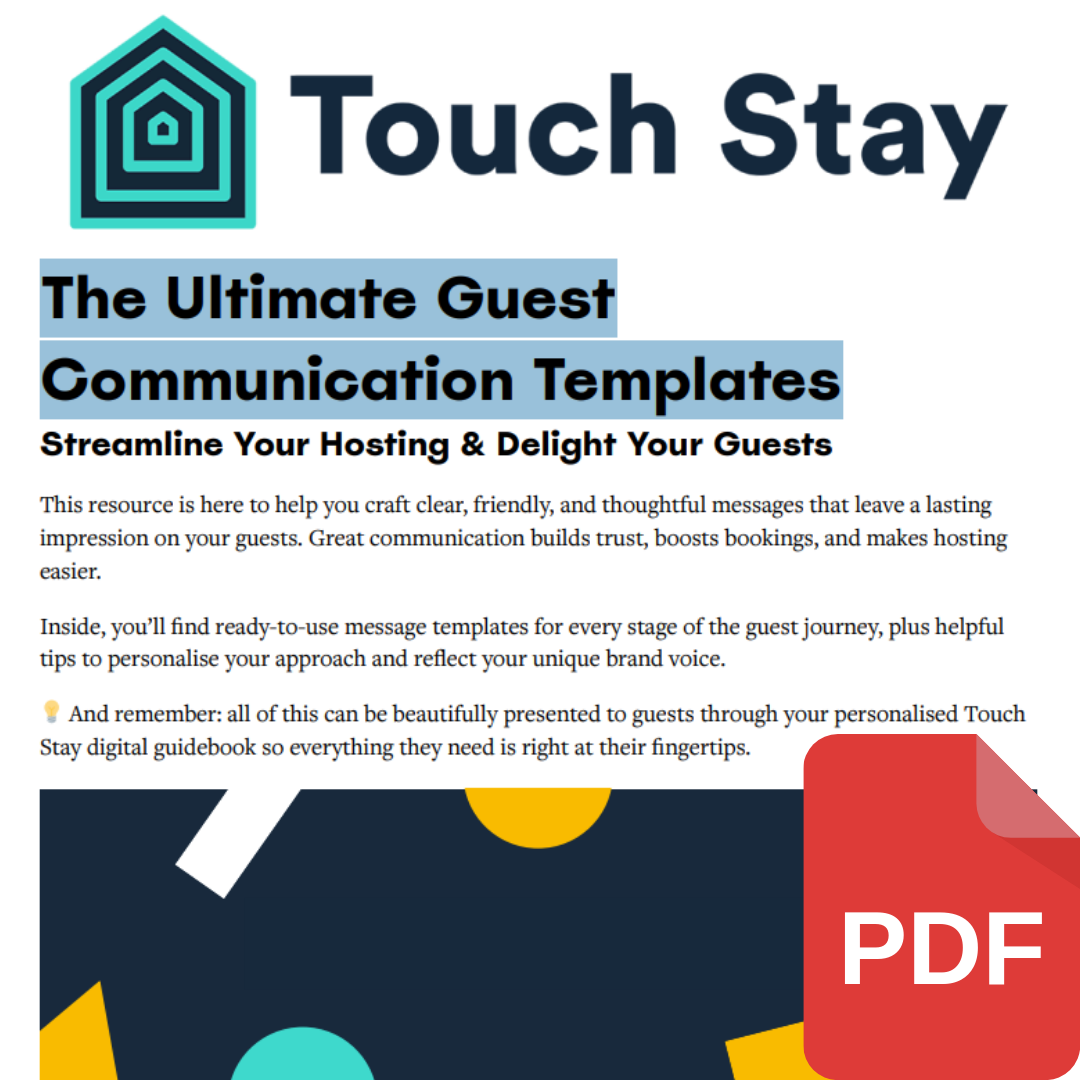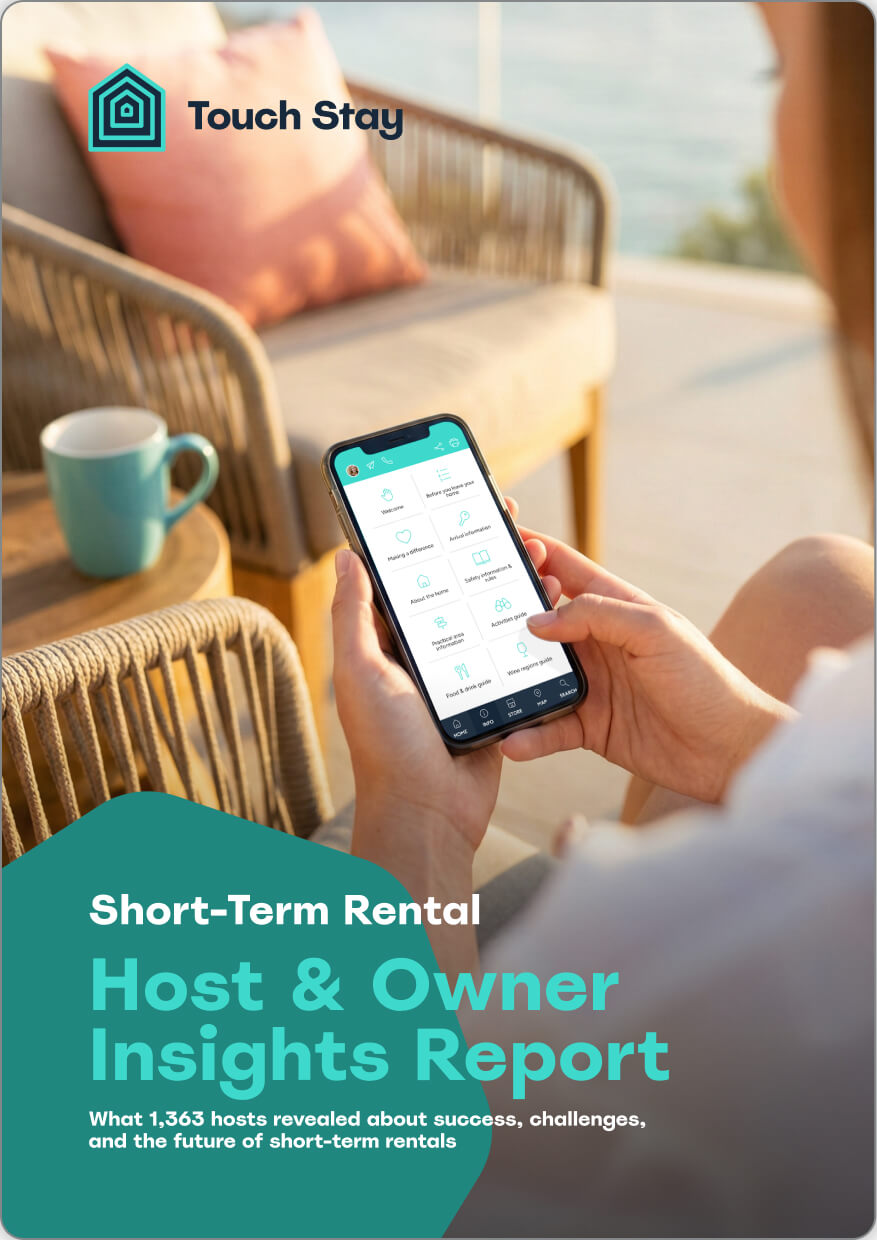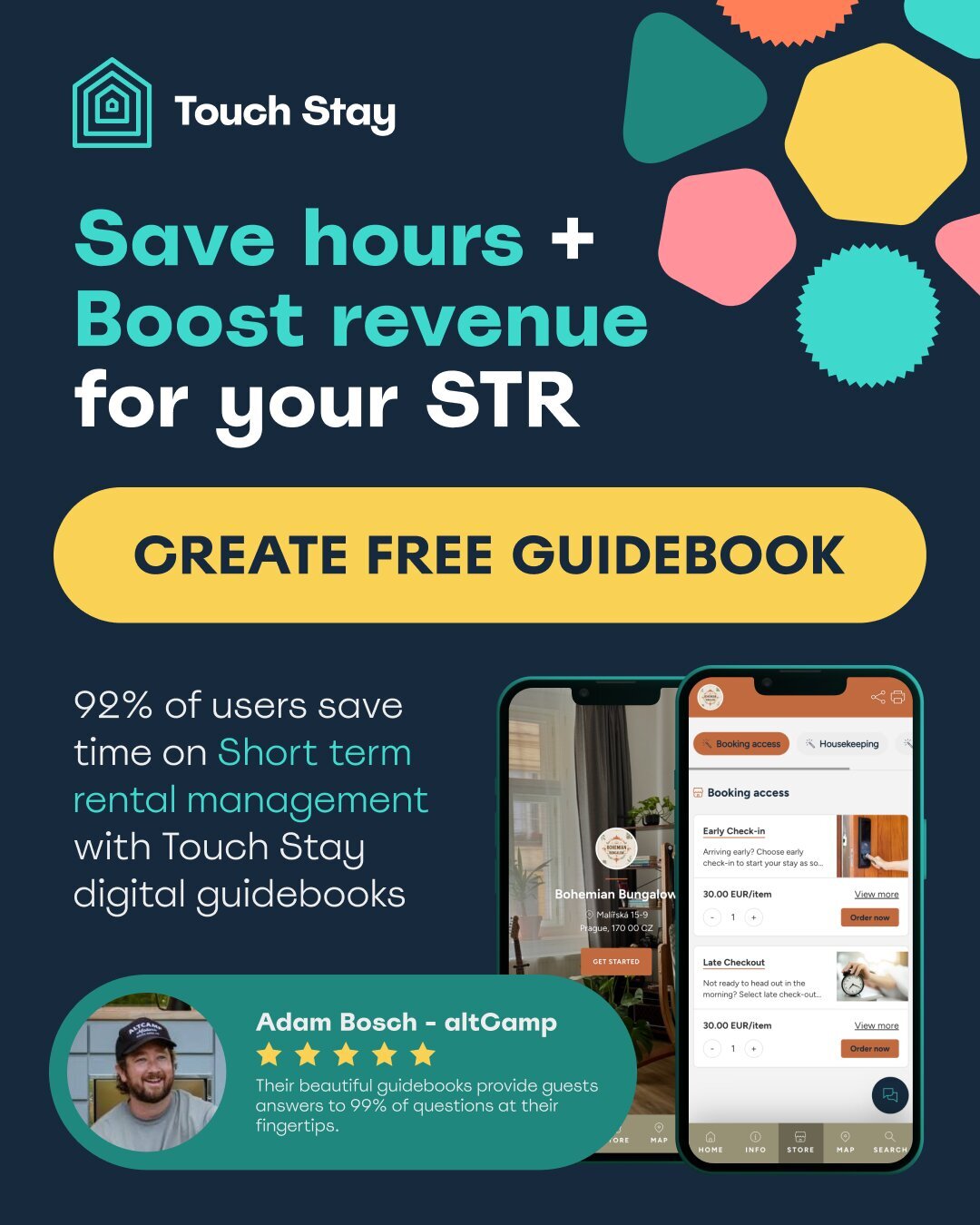Tax season can be a daunting time for Airbnb hosts, but the good news is that many of the expenses associated with running a short-term rental can be deducted. Using tools like TouchStay, which helps hosts organise guest communication and streamline operations, can also assist in this process.
In this guide, we’ll walk you through the key deductions available to Airbnb hosts and how you can take full advantage of them.
Your guidebook is just one link away!
Drop your Airbnb link to get started.
Introduction to Airbnb tax deductions
Airbnb tax deductions help hosts lower the costs of running a short-term rental by reducing taxable income. When used correctly, these deductions not only lessen your overall tax burden but also keep you in compliance with IRS guidelines.
Here’s what you’ll learn in this guide:
- What expenses are deductible: We’ll break down the most common deductions, such as repairs, utilities, and insurance.
- IRS guidelines and compliance: Learn how to navigate IRS rules, especially if you manage mixed-use properties.
- Maximising lesser-known deductions: We'll explore less obvious deductions that can help lower your taxable income even further, like travel and security costs.
- Best practices for record-keeping: How to stay organised and track expenses for easy deductions come tax season.
We'd love to show you how a digital guidebook could help you manage your Airbnb properties.
Understanding Airbnb tax deductions
Tax deductions are eligible expenses that Airbnb hosts can subtract from their total income to reduce their taxable income. These deductions are typically business-related expenses that you incur while running your short-term rental.
For Airbnb hosts, tax deductions are key to minimising taxable income. Essentially, any expense directly related to managing and maintaining your rental can be deducted as a business expense.
The IRS offers specific guidelines to help hosts differentiate between personal and business expenses, ensuring compliance and accurate deductions. For example, the IRS guidelines make a clear distinction between business and personal expenses.
Expenses related solely to your Airbnb operations, such as cleaning fees or property repairs, qualify as business expenses. On the other hand, personal expenses (like your personal cleaning products) are not deductible.
For example:
|
Eligible Expenses (Deductible) |
Ineligible Expenses (Non-Deductible) |
|
Repairs & Maintenance (for guest use areas) |
Personal Home Repairs (unrelated to rental use) |
|
Utilities (percentage used by guests) |
Personal Utilities (for personal areas only) |
|
Cleaning Services (for rental unit) |
Personal Cleaning Supplies (for non-rental use) |
|
Supplies for Guests (toiletries, linens, etc.) |
Personal Supplies (for personal household use) |
|
Insurance (homeowner’s/rental insurance) |
Life or Personal Insurance |
|
Depreciation (property, appliances, furniture) |
Depreciation on Personal Items |
|
Advertising & Listing Fees (Airbnb, other platforms) |
Entertainment Expenses (personal entertainment) |
|
Professional Services (accounting, legal) |
Personal Legal Fees |
|
Travel Expenses (related to managing the rental) |
Personal Travel Expenses (vacations, non-business) |
|
Security Systems (for the rental property) |
Personal Security Costs (for non-rental areas) |
Sometimes, expenses may overlap (such as utilities), and in these cases, only the portion used for rental purposes can be deducted. Let’s break this down with an example for utilities: If 25% of your property is rented out, only 25% of your utility costs can be claimed as a deduction.
|
Expense |
Total Cost |
% Used for Airbnb |
Deductible Amount |
|
Electricity |
$1,200 |
25% |
$300 |
|
Water |
$600 |
25% |
$150 |
|
Internet |
$720 |
25% |
$180 |
An effective way to manage and track these deductible expenses is by using tools like TouchStay to streamline operations and keep your business organised. Whether you're providing essential amenities or maintaining the property, keeping detailed records will ensure you're prepared come tax season.
IRS guidelines for short-term rentals
When managing short-term rentals like Airbnb, it’s important to understand IRS guidelines to stay compliant and maximise tax benefits. These regulations outline which rental income and expenses need to be reported, with specific attention to mixed-use properties and depreciation. Following these rules helps you take full advantage of deductions while avoiding potential misreporting issues.
The IRS also offers specific provisions, like the 14-Day Rule, that can exempt some hosts from reporting rental income. Here are some provisions to keep in mind:
- 14-Day Rule: If you rent out your property for fewer than 15 days a year, the IRS considers this a personal residence, and no rental income or expenses need to be reported.
- Mixed-Use Properties: If the property serves both personal and rental purposes, deductions apply only to the rental portion.
- Depreciation: You can deduct depreciation of your property and any furniture or appliances, which is spread out over several years, according to IRS rules.
Being well-versed in these guidelines ensures you're not only maximising your Airbnb tax write-offs but also staying compliant with tax laws. Misreporting or misclassifying expenses can lead to costly penalties, so it’s important to get it right.
Common Airbnb tax deductions
Tax deductions are expenses directly tied to managing and operating your rental property. Maximising these deductions helps lower your taxable income and prevents you from overpaying when tax season arrives.
Below are some of the most common deductible expenses you should be aware of when managing your short-term rental:
Major deductible expenses
There are significant expenses that Airbnb hosts can deduct from their taxable income, including:
- Mortgage interest and property taxes: If your property is used for rental purposes, you can deduct a portion of your mortgage interest and property taxes. This deduction is often proportional to the percentage of the property rented out.
- Repairs and maintenance: Any repairs, from fixing a leaky faucet to replacing a broken window, are fully deductible if they’re necessary to maintain the rental. Maintenance, such as repainting or general upkeep, also qualifies.
- Utilities: Expenses like electricity, water, gas, and internet are deductible, but only the portion that guests use. Keep careful records if you use the property personally to distinguish guest-related expenses.
- Cleaning and laundry services: The costs of cleaning the property between guest stays and laundry services for linens and towels are fully deductible.
- Insurance: Both homeowner’s and rental insurance policies are deductible, as long as they cover the rental property. Insurance is important to protect yourself from damages and liability.
- Advertising and listing fees: Any fees paid to platforms like Airbnb or other marketing channels to list and promote your property are deductible.
- Supplies and amenities: Items such as toiletries, linens, kitchenware, and other amenities provided to guests are deductible. These small but necessary expenses add up quickly, so be sure to keep receipts.
- Professional services: If you hire accountants, tax professionals, or legal advisors to assist with your rental business, their fees are deductible. It’s common for hosts to rely on professionals, and this cost can be written off.
- Depreciation: You can deduct the decrease in value of your property and its contents over time. This includes furniture, appliances, and the property itself. Depreciation helps account for the wear and tear that naturally occurs over the years.
|
Expense |
Explanation |
Deduction Example |
|
Mortgage Interest |
Deduct a portion based on rental usage. |
30% of mortgage interest if 30% of property is rented. |
|
Repairs and Maintenance |
Fully deductible if necessary for property upkeep. |
Fixing leaks, replacing a door, etc. |
|
Utilities |
Deduct only the portion used by guests. |
40% of utility bills if 40% of the home is rented. |
|
Cleaning Services |
Fully deductible, including laundry for guest linens. |
Cleaning between guests |
Be sure to keep detailed and well-organised records for each expense, as these documents will be essential for verifying your deductions in the event of an audit. Having clear documentation helps protect you and supports the accuracy of your tax filings.
Lesser-known deductions
In addition to the more common tax deductions, Airbnb hosts can benefit from several lesser-known write-offs that can help reduce their tax liability. These expenses, while often overlooked, can significantly lower your taxable income when properly claimed.
Taking the time to identify and track these additional deductions, such as travel or security expenses, can make a noticeable difference in your overall tax savings.
Overlooked deductible expenses:
Many hosts miss out on these less obvious deductions, such as:
- Travel expenses: If you travel to your property for maintenance, repairs, or guest services, your transportation costs (like gas or public transit fees) can be deducted. Keep detailed records of mileage or fares for these trips.
- Educational expenses: If you invest in learning more about property management or hospitality, such as taking online courses or attending workshops, these costs can be deducted. Webinars, books, or any form of training directly related to managing your rental can qualify.
- Professional memberships: Fees for joining industry associations, property management groups, or short-term rental networks can be deducted. Membership in organisations like the Vacation Rental Managers Association offers valuable networking and resources, making these costs eligible as a business expense.
- Security expenses: Money spent on enhancing the safety of your rental—such as installing cameras, smart locks, or full security systems—can be deducted. Protecting both your property and your guests is not only a wise business practice but also a deductible expense that can lower your taxable income.
|
Expense |
Explanation |
Deduction Example |
|
Travel Expenses |
Costs for trips related to rental management or upkeep. |
Mileage or public transport fees for trips to the property. |
|
Educational Expenses |
Learning about property management or hospitality. |
Cost of courses, books, and workshops. |
|
Professional Memberships |
Joining industry associations or rental networks. |
Fees for networks like the Vacation Rental Managers Association. |
|
Security Expenses |
Costs for installing cameras, smart locks, or security systems. |
Expense of home security upgrades. |
Record-keeping and documentation
To stay on top of record-keeping, consider tracking all receipts, invoices, and payments, separating personal and business expenses, and using digital tools or software like QuickBooks to streamline the process. Here’s how to stay on top of your record-keeping:
- Save all receipts: Whether it’s a minor expense like toiletries for guests or a larger cost like repairs, keep every receipt. You’ll need proof of each deduction you claim. Using a reliable receipt printer can make organizing and storing these records much easier, ensuring you always have proof of each deduction you claim.
- Take advantage of digital tools: Using a spreadsheet or specialised software like QuickBooks or Xero will help track income and expenses efficiently. These tools allow for easy categorisation and organisation and can help you avoid a year-end scramble.
- Maintain detailed notes: For mixed-use expenses (like utilities or internet), it's important to keep detailed records that distinguish between personal and business use. Document exactly what the expense covers to avoid confusion or mistakes when claiming deductions.
- Separate bank accounts: Open a dedicated bank account for your Airbnb business to simplify tracking. This makes it easier to monitor cash flow and keep personal finances separate.
- Store digitally: While keeping paper receipts is helpful, digital copies are more secure. Snap photos of receipts or use apps that scan and store them in cloud services. This minimises the risk of losing important documentation and makes access easier when filing taxes.
Accurate record-keeping is a simple way to avoid penalties and make sure you’re getting every deduction you’re entitled to.
Effective guest communication is just as crucial as keeping accurate financial records. Clear, timely messaging not only helps you avoid misunderstandings but also enhances the guest experience, leading to better reviews and smoother operations.

Download The Ultimate Guest Communication Templates—a free, ready-to-use PDF packed with message templates for every stage of the guest journey.
Calculating and claiming deductions
The process of calculating deductions involves identifying all eligible expenses, subtracting them from your gross rental income, and reporting the figures on the appropriate tax forms. You can do this on your own or hire a tax professional for accuracy. While handling taxes solo may save costs, hiring an accountant ensures you’re maximising all possible deductions and remaining compliant with IRS regulations.
Common mistakes to avoid
Filing taxes as an Airbnb host can be complex, and even small mistakes can lead to penalties or missed deductions. One common error is misclassifying personal expenses as business expenses.
For example, claiming 100% of utility costs when only a portion is used for guests could trigger an audit. Another mistake is failing to maintain proper records—without receipts or invoices, deductions may be disallowed.
Finally, hosts often overlook smaller but significant deductions, such as travel expenses related to property management or fees for professional services like accounting or legal advice.
|
Mistake |
Consequences |
How to Avoid It |
|
Misclassifying personal expenses as business expenses |
Audit risk and penalties for incorrect claims |
Keep clear records distinguishing personal from business use |
|
Failing to maintain proper records or receipts |
Deductions may be disallowed in case of audit |
Save all receipts, invoices, and proof of payment |
|
Overlooking small deductions (e.g., travel expenses) |
Missed opportunities to reduce taxable income |
Regularly track and document small expenses |
|
Not separating personal and business finances |
Difficulties in accurate reporting and audit complications |
Use separate bank accounts for Airbnb-related transactions |
Staying organized and aware of these pitfalls will make the tax filing process a lot smoother and allow you to take full advantage of the tax benefits available to Airbnb hosts.
Conclusion
Airbnb hosts have a range of opportunities to reduce their tax liability, from standard deductions like mortgage interest to lesser-known expenses such as security systems and travel costs. Staying informed and proactive helps you take full advantage of every eligible deduction.
By maintaining thorough records and utilising all eligible deductions, you can significantly reduce your taxable income. However, tax laws can be complex, especially with mixed-use properties or specific IRS guidelines.
Consider consulting a tax professional to make sure you’re applying deductions correctly and you’re staying up to date with the latest tax rules that fit your unique situation. This allows you to maximise savings and remain compliant with relevant tax regulations.
Want to streamline your guest experience while staying organised? Check out Touch Stay, the ultimate digital guidebook that helps you communicate all the important info your guests need—while keeping your short-term rental running smoothly.

Diana Bocco
Diana Bocco is an experienced writer with a passion for creating engaging content for the hospitality technology and travel sectors. Aside from a portfolio featuring work for industry giants like Booking.com and TripAdvisor, Diana also has extensive experience in creating business and e-commerce content. An avid traveler herself, Diana combines her on-the-road insights with professional expertise to help vacation rental owners enhance guest experiences and grow their businesses.
Be the first to know!
Join our newsletter for early access to:
- ✅ Free guides
- ✅ Pro tips & tricks
- ✅ Time saving tutorials
- ✅ Latest blog posts
- ✅ Checklists & templates






















